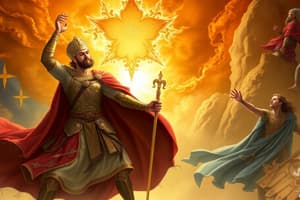Podcast
Questions and Answers
¿Cuáles son los temas explorados en las obras de Calderón de la Barca?
¿Cuáles son los temas explorados en las obras de Calderón de la Barca?
Temas de orden social y dinámicas de poder.
¿Qué concepto fundamental se destaca en 'La vida es un sueño'?
¿Qué concepto fundamental se destaca en 'La vida es un sueño'?
La individualidad frente a las influencias sociales.
¿Qué pregunta plantea la obra sobre la percepción de la realidad?
¿Qué pregunta plantea la obra sobre la percepción de la realidad?
¿Nuestras percepciones de la realidad son moldeadas únicamente por factores externos o poseemos una esencia inherente que nos hace seres únicos?
¿Qué elementos simbólicos utiliza Calderón de la Barca en 'La vida es un sueño'?
¿Qué elementos simbólicos utiliza Calderón de la Barca en 'La vida es un sueño'?
¿Por qué 'La vida es un sueño' sigue siendo una influencia significativa en el teatro moderno?
¿Por qué 'La vida es un sueño' sigue siendo una influencia significativa en el teatro moderno?
¿Quién escribió la obra 'La vida es un sueño'?
¿Quién escribió la obra 'La vida es un sueño'?
¿En qué año se representó por primera vez 'La vida es un sueño' en Madrid?
¿En qué año se representó por primera vez 'La vida es un sueño' en Madrid?
¿Quién es el protagonista de la obra 'La vida es un sueño'?
¿Quién es el protagonista de la obra 'La vida es un sueño'?
¿Qué sugiere el sabio al rey Basilio con respecto al príncipe Segismundo?
¿Qué sugiere el sabio al rey Basilio con respecto al príncipe Segismundo?
¿Cuál es el impacto de 'La vida es un sueño' en el teatro moderno?
¿Cuál es el impacto de 'La vida es un sueño' en el teatro moderno?
Study Notes
La Vida Es Un Sueño: A Play That Shaped Modern Theatre
"La vida es un sueño," which translates to "Life is a Dream" in English, is a play written by Pedro Calderón de la Barca, one of Spain's most prominent Golden Age dramatists. This philosophical drama was first performed in Madrid in 1635. It has been widely considered a masterpiece of the Spanish Golden Age, with its exploration of free will and personal identity contributing significantly to shaping modern theatre.
Plot Summary
The play revolves around Prince Segismundo, who is born under a curse that dictates he must live his entire life in prison. His father, King Basilio, consults a wise man, who suggests they test the prince's nature by releasing him from captivity. When the experiment proves successful, Segismundo returns to prison, convinced that all his experiences have been dreams. However, it becomes clear that this is not the case, and the prince emerges as a changed person, able to make moral judgments and take responsibility for his actions.
Influence on Modern Theatre
Calderón's work, including "La vida es un sueño," has had a profound impact on the development of Western theater. Its blend of existential philosophy and complex plotlines has inspired generations of playwrights. For example, William Shakespeare's play "Hamlet," which shares thematic similarities with "La vida es un sueño," was influenced by this work, demonstrating how far-reaching Calderón's ideas were.
Moreover, Calderón's plays often explore themes of social order and power dynamics, which resonated deeply with audiences during their time and continue to do so today. His use of irony and ambiguity in storytelling also opened up new possibilities for contemporary playwrights, allowing them to create more nuanced and thought-provoking narratives.
Key Themes and Ideas
At the core of "La vida es un sueño," is the concept of individuality versus societal influences. The play raises questions about whether our perceptions of reality are shaped solely by external factors or if we possess an inherent essence that makes us unique beings. Additionally, it explores the significance of choice and free will in determining one's destiny.
Furthermore, Calderón employs a metaphorical approach to characterization, using symbols such as mirrors and shadows to represent the relationship between perception and reality. This symbolic language adds depth to the play's themes and has become a hallmark of baroque literature.
In conclusion, "La vida es un sueño" has been a cornerstone of Spanish and world literature, serving as both an historical artifact and a timeless reflection on universal human experiences. With its intricate plots, complex characters, and insightful commentary on society and human nature, this play remains a significant influence on modern theatre even after four centuries since its premiere.
Studying That Suits You
Use AI to generate personalized quizzes and flashcards to suit your learning preferences.
Description
Explore the historical significance and enduring impact of Pedro Calderón de la Barca's masterpiece play 'La vida es un sueño'. Learn about the key themes, plot summary, and its influence on modern theatre, including its contribution to shaping existential philosophy in Western drama.




